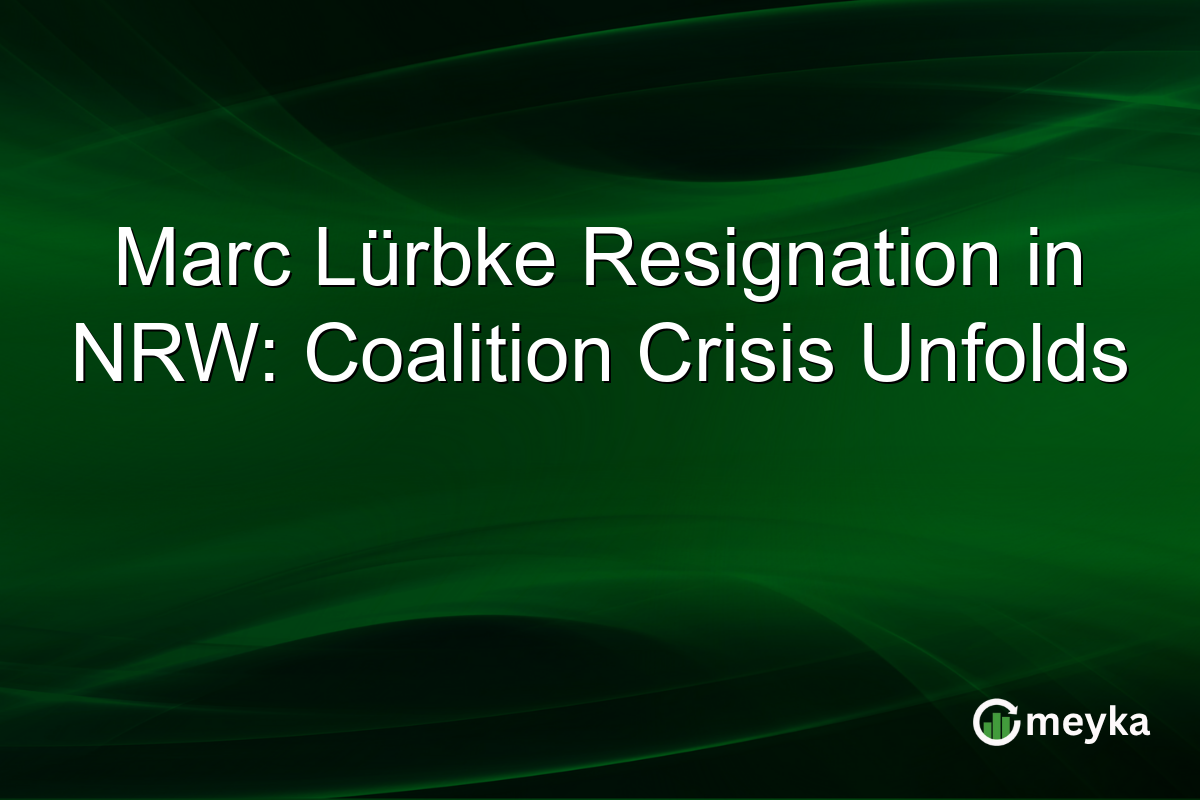Marc Lürbke Resignation in NRW: Coalition Crisis Unfolds
Today, Marc Lürbke of the Free Democratic Party (FDP) in North Rhine-Westphalia (NRW) announced his resignation, shaking the region’s political landscape. The sudden exit cites internal disputes and alleged bullying, immediately stirring a crisis within the coalition. This event raises questions about the stability of Germany’s most populous state’s policies, affecting both political confidence and investor expectations.
Resignation Details and Immediate Repercussions
Marc Lürbke’s resignation from his leadership role in the FDP and the NRW state parliament stunned many today. Citing internal party disagreements and reports of bullying, Lürbke’s decision has thrown the regional coalition into disarray. The FDP’s role within the coalition is crucial for maintaining policy continuity, and his departure has triggered concerns about potential leadership gaps and decision-making paralysis. This situation could affect policy stability, a topic closely monitored by both political analysts and stakeholders.
Impact on North Rhine-Westphalia Coalition
The North Rhine-Westphalia coalition now faces significant challenges following Lürbke’s exit. The FDP is one of the key parties in this coalition, and the sudden leadership vacuum could disrupt strategic initiatives. Observers are worried that the internal power struggle might delay important legislative projects, crucial for maintaining economic growth and social welfare programs in the state. This political uncertainty could cause investor hesitancy, potentially driving away funding needed for infrastructure and tech innovations in NRW.
Broader Implications for German FDP Politics
Lürbke’s resignation also sends ripples across German FDP politics today. His decision exposes underlying tensions within the party, potentially influencing its reputation at the national level. The FDP needs to manage this situation adeptly to avoid losing public favor and electoral support. Analysts suggest that the party must address internal conflicts promptly, ensuring stability and cohesion moving forward. A failure to do so might weaken their influence not only in NRW but also in future German federal elections.
Investor Confidence and Market Reactions
Political instability often leads to economic uncertainty, and the North Rhine-Westphalia coalition crisis is no exception. Investors are particularly concerned about the interruption of key projects in NRW, a hub for industries including automotive and technology. While immediate market responses are tempered by the broader European economic stability, continued disarray within the region could shift investor sentiments negatively, affecting the economic outlook of Germany’s largest federal state. Read more on Bloomberg
Final Thoughts
Marc Lürbke’s unexpected resignation underscores significant unrest within North Rhine-Westphalia’s political framework. As the FDP grapples with leadership transitions, the broader coalition faces pressing questions about governance continuity. Policymakers must navigate this tumultuous period carefully to reassure constituents and stabilize investor perceptions. Addressing these challenges promptly is crucial for maintaining both economic momentum and political coherence in Germany’s most populous state.
FAQs
Marc Lürbke resigned citing internal disputes and claims of bullying within the party. His abrupt exit is seen as a reflection of deeper issues within the FDP’s regional leadership.
The resignation poses significant challenges, creating a leadership gap that might disrupt policy continuity. This can affect legislative initiatives essential for regional development.
Political instability often dampens investor sentiment. Prolonged uncertainty in the NRW coalition can lead to hesitations in investments, affecting key projects and economic growth in the state.
Lürbke’s resignation highlights issues within the FDP that can harm its national standing. Addressing internal conflicts is crucial to maintain influence in both regional and future federal elections.
The FDP should swiftly address internal issues, establishing stable leadership to regain public trust and ensure smooth operations within the North Rhine-Westphalia coalition.
Disclaimer:
This is for information only, not financial advice. Always do your research.






